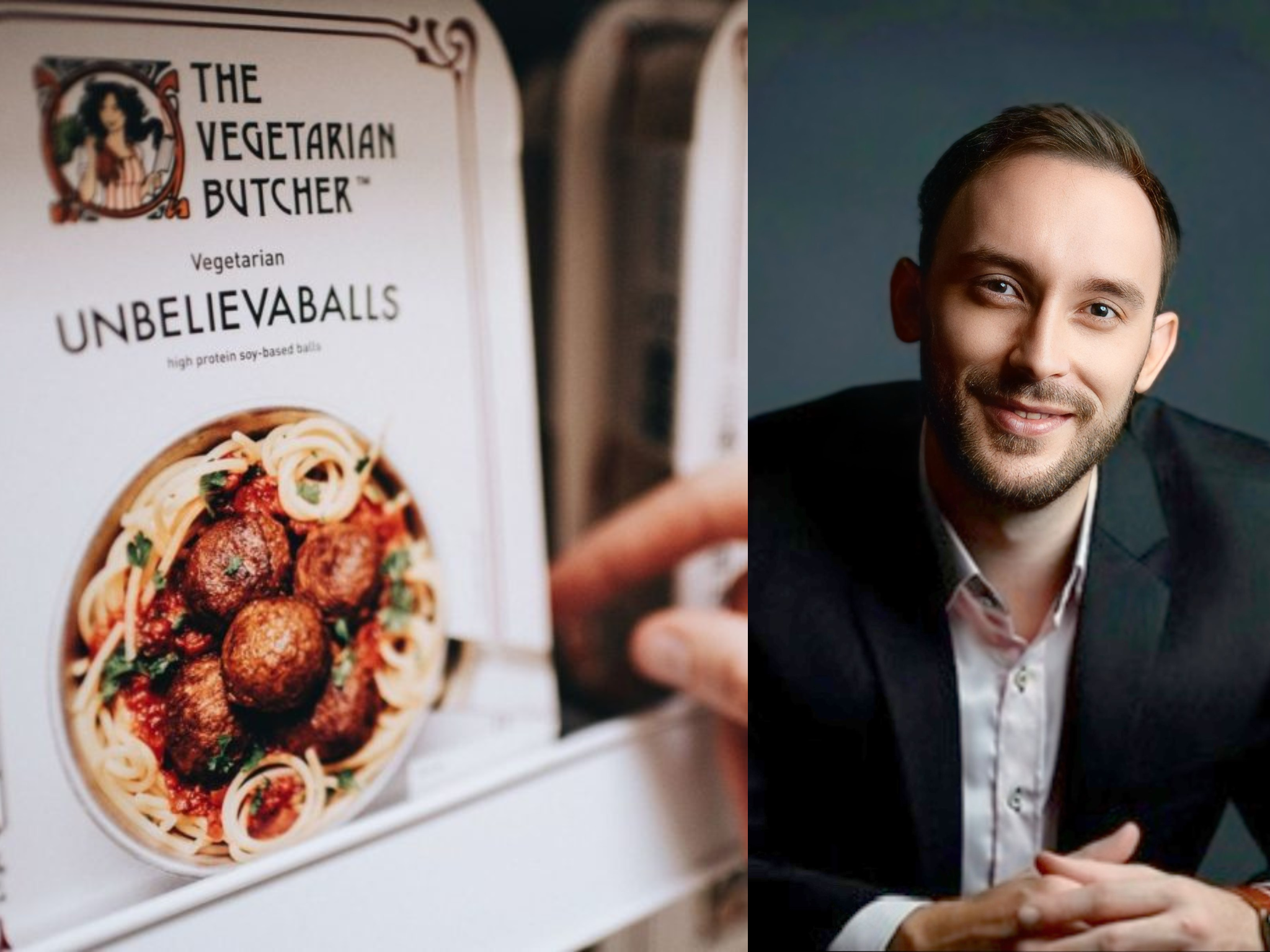
Unilever is planning an auction to sell The Vegetarian Butcher, its flagship plant-based meat brand. This news has sent ripples through the industry, prompting many to ask: What does this mean for the future of plant-based meat, and how did we get here?
Back in 2018, Unilever made a daring move. Recognising the surging interest in plant-based diets, the global conglomerate acquired The Vegetarian Butcher, aiming to lead in a sector that was one of the fastest-growing in the food industry. Their ambitions were grand, with goals reportedly set to reach €1.5 billion in sales by 2025.
Leveraging its extensive retail networks and relationships, Unilever propelled The Vegetarian Butcher to impressive heights in Europe, with significant achievements that included:
- Major partnerships: Striking what could be the world’s largest plant-based meat deal with Restaurant Brands International (RBI) in Europe (the result of which was the brand’s patties in Burger Kings across Europe).
- Retail expansion: Establishing a strong presence across European supermarkets, thanks to Unilever’s clout.
Early on, The Vegetarian Butcher seemed poised for success. Yet, despite these strides, the brand has struggled to replicate this performance outside Europe. In the US, The Vegetarian Butcher couldn’t quite take off; in other global markets, it remained largely under the radar. It became clear that its focus was heavily European-centric, offering solutions for food services chains and a generic wide portfolio of products aiming to address the perceived opportunity for plant-based meat to simply mimic top-selling meat items. The company’s plans – like most other plant-based meat companies – rested on the premise that PTC (Price Taste Convenience) primarily drove food choice.
The reality check

So, what went wrong? To understand, we need to look at the broader market trends. Since 2021, the plant-based meat market has shown signs of stagnation and even contraction, especially in the US. This slowdown caught many by surprise, given the earlier optimism.
Comparisons with plant-based milk offer some insights. Plant-based milk has captured nearly 15% of retail milk sales. Walk into any urban coffee shop in a developed country, and you’ll notice that plant-based milk options might account for about half of all milk used—far surpassing the adoption rates of plant-based meat alternatives in similar settings.
Why the difference? It boils down to consumer perceptions and emotional connections.
Emotional drivers and consumer behaviour
For many, milk is a staple, but it is not necessarily an aspirational product. Additionally, lactose intolerance and milk allergies affect a significant portion of the population, making alternatives more appealing. Plant-based milks have successfully positioned themselves as not just substitutes but as trendy and varied options that cater to health, environmental concerns, and taste preferences.
Meat, on the other hand, holds a different place in people’s hearts and on their plates. It’s often the star of the meal, rich in cultural significance and positive emotional associations. Unlike milk, few people have physical adverse reactions to meat, and vegetarians and vegans still represent a tiny minority in most societies.
When asked what it would take to choose plant-based meat, consumers often mention “price, taste, and convenience.” However, these factors, while important, may not override the deep-rooted preferences and emotional connections people have with meat. Simply put, many consumers don’t feel a compelling need to replace something they enjoy and have no issues with. This is a conclusion I first had sometime around late 2022 while experiencing first-hand the challenges beyond Price, Taste and convenience. While it is a topic I have written about a few times, this article from Jacob R. Peacock dives into it with more depth.
Industry challenges and the path forward

The challenges faced by The Vegetarian Butcher aren’t unique. Many companies in the plant-based meat sector are grappling with similar issues:
- Financial strains: With venture capital funding drying up since 2021, especially for early-stage and loss-making companies, many startups have shut down or are struggling to stay afloat.
- Market saturation and consolidation: After seeing smaller companies closing down, we are entering a phase where companies with substantial revenues are becoming targets for consolidation. The Vegetarian Butcher, with estimated revenues between €50 million and €150 million, exemplifies this trend. On the bright side, this is probably where the winning companies will enter their phase of best returns on investment.
Technological innovation, once seen as the key to unlocking mass adoption, hasn’t provided the silver bullet many hoped for. While advancements have improved the taste and texture of plant-based meats—particularly in products like burgers and nuggets—they haven’t significantly shifted consumer behaviour. At the same time, negative consumer campaigns have driven negative sentiment to a very high level against plant-based meat, boosted by narratives that the products are not healthy. Price reductions, another strategy employed by well-funded players, haven’t yielded the expected boost in adoption either.
If technology and pricing strategies aren’t moving the needle, perhaps it’s time to reassess our understanding of the problem.
Rethinking the approach
The consistent hurdles suggest that the industry may have misread the consumer adoption curve. It’s not just about making plant-based meat as tasty or as affordable as animal meat. It’s about addressing the emotional and cultural significance of meat in people’s lives.
We need to ask deeper questions:
- What truly motivates consumers to change long-standing dietary habits?
- How can plant-based brands create products that don’t just mimic meat but offer new, exciting culinary experiences?
- In what ways can the industry engage with consumers on an emotional level, beyond the usual talking points of health and sustainability?
- Realistically, how long will this really take? Are the companies and shareholders prepared for a much longer journey than initially anticipated?
Unilever’s strategic considerations

For a corporate giant like Unilever, the decision to potentially sell The Vegetarian Butcher likely comes down to strategic priorities. Managing a brand in a slow-growth, high-burn sector with an uncertain future may not align with its goals. The company’s resources invested could perhaps yield better returns elsewhere.
However, this doesn’t spell doom for The Vegetarian Butcher. On the contrary, stepping out from under Unilever’s vast umbrella might offer the brand a chance to be more agile and focused. A smaller, dedicated team could steer the company with the nimbleness required in such a dynamic market.
Looking ahead with optimism
Despite the challenges, there are reasons to be hopeful:
- Significant achievements: The Vegetarian Butcher’s success in securing major contracts, like with RBI in Europe, is no small feat. It demonstrates the brand’s potential to compete on a big stage.
- Solid foundation: With an impressive distribution network and a diverse product portfolio, the brand has a strong platform to build upon.
The plant-based meat industry is at a crossroads. While initial expectations may not have been met, this moment offers an opportunity to recalibrate and innovate.
The potential sale of The Vegetarian Butcher is more than just a corporate transaction; it’s a reflection of the evolving landscape of plant-based meats. It challenges industry players to look beyond conventional strategies and delve deeper into understanding the consumer psyche.
For the industry to thrive, it must embrace a more nuanced approach—one that recognizes the complex relationship people have with food. By creating products that resonate on an emotional level and by crafting narratives that align with consumers’ values and desires, plant-based brands can forge a path forward.
Change is rarely linear, and the adoption of new food paradigms takes time. The journey of The Vegetarian Butcher offers valuable lessons for future innovators. As the brand potentially moves into a new chapter, there’s hope that it will continue to push boundaries and inspire others in the quest for a more sustainable and diverse food landscape.
The post Is Unilever’s Sale of The Vegetarian Butcher A Turning Point for Plant-Based Meat? appeared first on Green Queen.
This post was originally published on Green Queen.